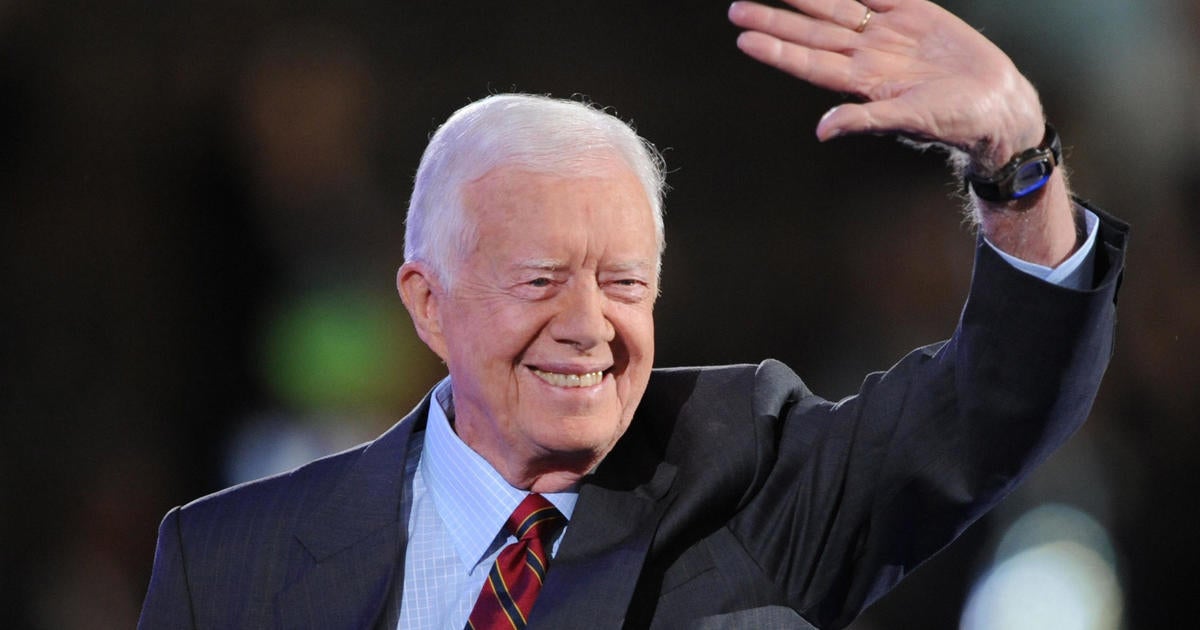Jimmy Carter, the 39th president of the United States, passed away on Sunday at the age of 100. Despite serving only one term in office, he continued to make a significant impact through his humanitarian work and lived long enough to become the oldest former president in U.S. history. His death was announced by the Carter Center in a statement, revealing that he passed away peacefully at his home in Plains, Georgia, surrounded by his family.
Chip Carter, the former president’s son, shared a heartfelt statement expressing his admiration for his father, calling him a hero to not only himself but to everyone who believes in peace, human rights, and unselfish love. The Carter family extended their gratitude to those honoring his memory by continuing to uphold these shared beliefs. Public observances are set to take place in Atlanta and Washington, D.C., followed by a private interment in Plains, Georgia.
President Biden declared January 9 as a national day of mourning for Carter, ordering that flags at federal facilities be flown at half-staff for 30 days. In his proclamation, Biden praised Carter as a man of character, courage, and compassion, highlighting his lifetime of service that defined him as one of the most influential statesmen in U.S. history. He described Carter as a humble servant of God and the people, a champion of global peace and human rights, and an honorable leader whose moral clarity and hopeful vision uplifted the nation and changed the world.
Carter had been receiving hospice care at his home for nearly two years following a series of short hospital stays. The decision to forego additional medical intervention in favor of spending his remaining time at home with his family was made in February 2023. Despite his declining health, Carter remained active well into his 90s, continuing his work with Habitat for Humanity and the Carter Center, as well as teaching Sunday school at his church in Plains, Georgia.
Throughout his life, both in and out of office, Carter established a legacy as a tireless advocate for peace and humanitarian causes. He is best known for brokering the Camp David Accords in 1978, which laid the foundation for peace in the Middle East. In recognition of his efforts, he was awarded the Nobel Peace Prize in 2002 for his decades-long commitment to advancing international peace, democracy, and human rights.
While Carter achieved many successes during his presidency, his time in office was marked by challenges, including the U.S. energy shortage and the Iran hostage crisis. His outsider status, which initially appealed to voters seeking a change in politics after Watergate, also hindered his ability to cultivate relationships in Washington, leading to conflicts with Democratic leaders in Congress and a decline in popularity as oil prices and inflation soared.
Despite these challenges, Carter’s presidency was not without accomplishments. He established the departments of Energy and Education, formalized diplomatic ties with China, and oversaw the return of the Panama Canal to Panamanian control. One of his most significant achievements was the Camp David Accords, a peace treaty between Israel and Egypt that he helped negotiate in 1979.
The Iranian hostage crisis, which unfolded during Carter’s reelection campaign, further strained his presidency as the nation grappled with economic struggles and high inflation. However, in the final days of his administration, Carter and his team successfully negotiated the release of the American hostages on Ronald Reagan’s Inauguration Day.
After leaving the White House, Carter and his wife, Rosalynn, founded The Carter Center in Atlanta, dedicated to promoting peace and global health. Carter emphasized the importance of working together for peace, a sentiment echoed in his acceptance speech for the Nobel Peace Prize in 2002. The couple also volunteered with Habitat for Humanity, building houses and supporting the organization’s mission for over three decades.
Carter’s health challenges, including a cancer diagnosis in 2015, multiple falls, and hospitalizations, did not deter his commitment to public service. He underwent treatment with immunotherapy and made a remarkable recovery, with subsequent scans showing no signs of cancer. Despite setbacks, such as breaking his hip and suffering a fractured pelvis, Carter continued to teach Sunday school and remain active in his humanitarian efforts.
Tragically, in May 2019, Rosalynn Carter was diagnosed with dementia and passed away later that year in November. The couple, who celebrated their 77th wedding anniversary in July 2023, are survived by their four children, grandchildren, and great-grandchildren. Jimmy Carter leaves behind a legacy of peacebuilding and service, embodying the values of compassion, integrity, and dedication to improving the lives of others.
As one of the most active former presidents in history, Carter’s impact extended far beyond his time in office. He planted seeds of peace and controversy, inspiring others to follow his example of public service and humanitarianism. While his passing marks the end of an era, his legacy as a champion for peace and human rights will continue to inspire future generations to strive for a better world.









